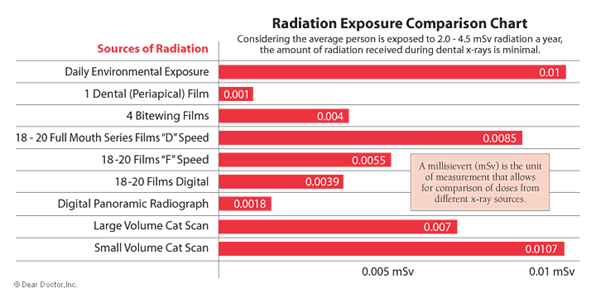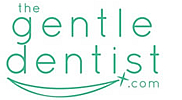Understanding Dental X-Rays: Safety, Benefits, and the Reader's Digest Debate | The Gentle Dentists Shelby Township

There has been ongoing discussion regarding the overuse of X-rays across medical fields, highlighted by a recent Reader’s Digest article. As dental professionals, we believe it’s essential to clarify the role, benefits, and safety of dental X-rays, especially given the minimal radiation exposure involved.
Understanding Dental X-Rays and Radiation Exposure
Dental X-rays emit very low levels of radiation, especially when compared to everyday sources of exposure. For instance, a complete set of dental X-rays exposes you to about 5 microsieverts (?Sv) of radiation. In comparison, a single flight from New York to Los Angeles exposes you to approximately 40 ?Sv—eight times the exposure of dental X-rays. Spending a day outdoors exposes you to a similar amount of radiation due to natural environmental factors.
According to the Radiation Exposure Comparison Chart:
- A single dental film (periapical) emits about 0.001 mSv of radiation.
- A full mouth series using digital films emits approximately 0.0039 mSv.
- In comparison, a large-volume CAT scan can expose patients to 0.007 mSv.
The Benefits of Dental X-Rays
Dental X-rays provide insights that would be impossible to see during a visual exam alone. X-rays detect differences in tissue density, allowing us to identify issues such as:
- Tooth Decay: Early detection of cavities and decay that aren’t visible on the surface.
- Bone Health: Monitoring bone loss around the teeth, especially in patients with periodontal disease.
- Pathology in the Jaw: Identifying tumors, cysts, and other abnormalities within the jaw.
- Impacted Teeth and Nerve Positioning: Essential for planning extractions, especially of wisdom teeth.
Without X-rays, these conditions could go undiagnosed until they cause pain or require more invasive procedures. The panoramic X-ray, for instance, offers a broad view of the entire mouth, including the jaw, sinus area, and teeth alignment.
How Often Should You Get Dental X-Rays?
The frequency of X-rays depends on individual health needs. For example:
- Seniors and Patients with Dry Mouth: Patients on medications that cause dry mouth are more susceptible to cavities and may need more frequent X-rays.
- Patients with Periodontal Disease: Regular X-rays help track bone loss and monitor the health of periodontal tissues.
- Low-Risk, Healthy Adults: May only need X-rays every 2-3 years for preventive monitoring.
X-ray schedules are personalized to each patient to ensure thorough, appropriate care.
Addressing Concerns About Radiation
Many patients worry about radiation exposure due to media coverage. However, the level of radiation from dental X-rays is so low that the benefits significantly outweigh the risks. Modern digital X-rays reduce exposure even further compared to traditional film X-rays, allowing us to use them with confidence.
Consider this scenario: Imagine a patient who declines an X-ray due to radiation concerns. A year later, she returns with jaw pain, allowing us to take a panoramic X-ray that reveals a lesion. If caught earlier, her condition could have been treated before becoming severe. Declining necessary X-rays can lead to missed diagnoses, delayed treatment, and potential health complications.
Legal and Ethical Responsibilities
Dentists are legally required to follow standard care practices, including taking recommended X-rays. If a patient chooses not to have an X-ray and later develops an issue that could have been diagnosed earlier, it places both the patient and the provider at risk. For this reason, we encourage patients to trust that X-rays are recommended in their best interest.
Faith and Health
At The Gentle Dentists, we believe in the importance of stewardship over one’s health. Proverbs 13:14 says, “The teaching of the wise is a fountain of life, turning a person from the snares of death.” We take the responsibility of providing dental care seriously, ensuring that our patients receive the best care possible to support both their physical and spiritual well-being.
Conclusion
The radiation levels associated with dental X-rays are minimal, and the diagnostic benefits far outweigh any risk. X-rays allow us to see beyond what’s visible to the eye, catching potential issues early, reducing the need for extensive procedures, and ultimately protecting your health. If you haven’t had dental X-rays in a while, consider scheduling an appointment to stay proactive about your oral health.
